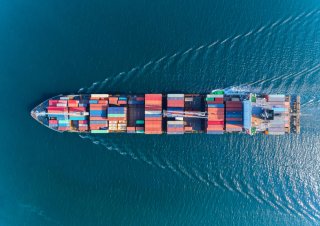"Flags of Convenience" Flout Iran Sanctions
To defend U.S. sanctions, policymakers should target nations that allow ships to fly under “flags of convenience.”
While security experts and policymakers cry foul at the recent U.S.-Iran hostage exchange, the $6 billion in unfrozen assets that will be used by the Iranian regime, as a result, pales in comparison to assets smuggled by ships around the world dodging already-existing sanctions.
Like North Korea, Iran has long used ships flying the flag of another country to skirt sanctions and fund their governments. By dodging sanctions that target key industries, highly sanctioned regimes are able to continue to fund nuclear weapons programs, terror organizations, and other threats to U.S. interests. To effectively sanction Tehran, Washington needs to crack down on asset smuggling, especially now that Iran has billions of dollars to retool its smuggling operations.
These “flags of convenience” are mostly registered to countries that have open registries that don’t require owners to be citizens of the country. Some allow registrations online, requiring only a payment. Panama, Liberia, the Marshall Islands, Hong Kong, and Singapore are the top flag of convenience states, accounting for 77 percent of all vessels registered under flags of convenience.
Under Panamanian-flagged ships, Iran has smuggled sanctioned oil. North Korea has used flags of convenience vessels to smuggle heroin to fund their military operations, while Russia and Venezuela also use flags of convenience for their vessels to deliver up to 2 million barrels of oil daily to China.
Ships flying flags of convenience are easy targets for smuggler operations. Since most of the countries with open registries have little or no naval security forces to protect their own, their ships are vulnerable. Hostile nations can seize control of ships and crew members to be used in hostage negotiations. Just this summer, the U.S. Navy stopped Iranian vessels from seizing two oil tankers, one Marshall Islands-flagged ship and another flying the Bahamian flag.
The Iranian military has repeatedly seized ships as retaliation for the U.S. sanctions enforcement against their country. In the last two years, Iran has taken control of five ships in international waters. In April, Iran took control of an oil tanker traveling to the United States flagged under the Marshall Islands and is still holding it in port. Iran’s ability to seize energy supplies and disrupt shipping in the Strait of Hormuz can be used to threaten oil supplies and shipments to both the United States and allied nations.
Most flags of convenience states have registries that are privately managed or poorly maintained. Countries with weak economies are incentivized to offer lax registration requirements. The Marshall Islands, one of the worst offenders, is currently renegotiating the Compact of Free Association (COFA), which provides the island nation with financial assistance. U.S. negotiators should prioritize mandating that the Marshall Islands clean up its shipping registry in exchange for more generous aid packages. This would be a win-win, ensuring strict enforcement of U.S. sanctions and granting the Marshall Islands stronger economic aid.
America’s multimillion-dollar aid to Liberia should be similarly contingent upon a crackdown on its ship registry. For wealthier countries like Panama, the United States should expand penalties for sanctions-dodging.
The United States should not wait for the International Maritime Organization’s (IMO) Secretary-General to improve its sanctions regime. The UN’s IMO elected Panamanian Arsenio Antonio Dominguez Velasco as its next Secretary-General in July. As long as countries like Panama, the Marshall Islands, Liberia, and, more recently, landlocked Mongolia maintain corrupt shipping registries, regimes like Iran will continue to evade sanctions and pursue their interests.
To defend U.S. sanctions, policymakers should target the flag of convenience states. With the $6 billion in unfrozen assets now aiding Iran’s sanction-dodging efforts, time is of the essence.
Roy Mathews is a Writer for Young Voices. He is a graduate of Bates College and a 2023 Publius Fellow at The Claremont Institute. He has been published in the Wall Street Journal, National Review, and Law & Liberty. You can follow him on Twitter here.
Image: Shutterstock.

